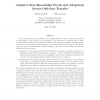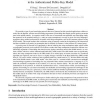169 search results - page 3 / 34 » Which Languages Have 4-Round Zero-Knowledge Proofs |
TCC
2009
Springer
14 years 8 months ago
2009
Springer
In the setting of secure computation, a set of parties wish to securely compute some function of their inputs, in the presence of an adversary. The adversary in question may be st...
SCN
2004
Springer
14 years 26 days ago
2004
Springer
Abstract. We introduce and define the notion of identity-based zeroknowledge, concentrating on the non-interactive setting. In this setting, our notion allows any prover to widely...
CRYPTO
2009
Springer
14 years 2 months ago
2009
Springer
Abstract. We show that only languages in BPP have public-coin, blackbox zero-knowledge protocols that are secure under an unbounded (polynomial) number of parallel repetitions. Thi...
EUROCRYPT
2006
Springer
13 years 11 months ago
2006
Springer
Non-interactive zero-knowledge (NIZK) proof systems are fundamental cryptographic primitives used in many constructions, including CCA2-secure cryptosystems, digital signatures, an...
CORR
2006
Springer
13 years 7 months ago
2006
Springer
We consider a type of zero-knowledge protocols that are of interest for their practical applications within networks like the Internet: efficient zero-knowledge arguments of knowl...


